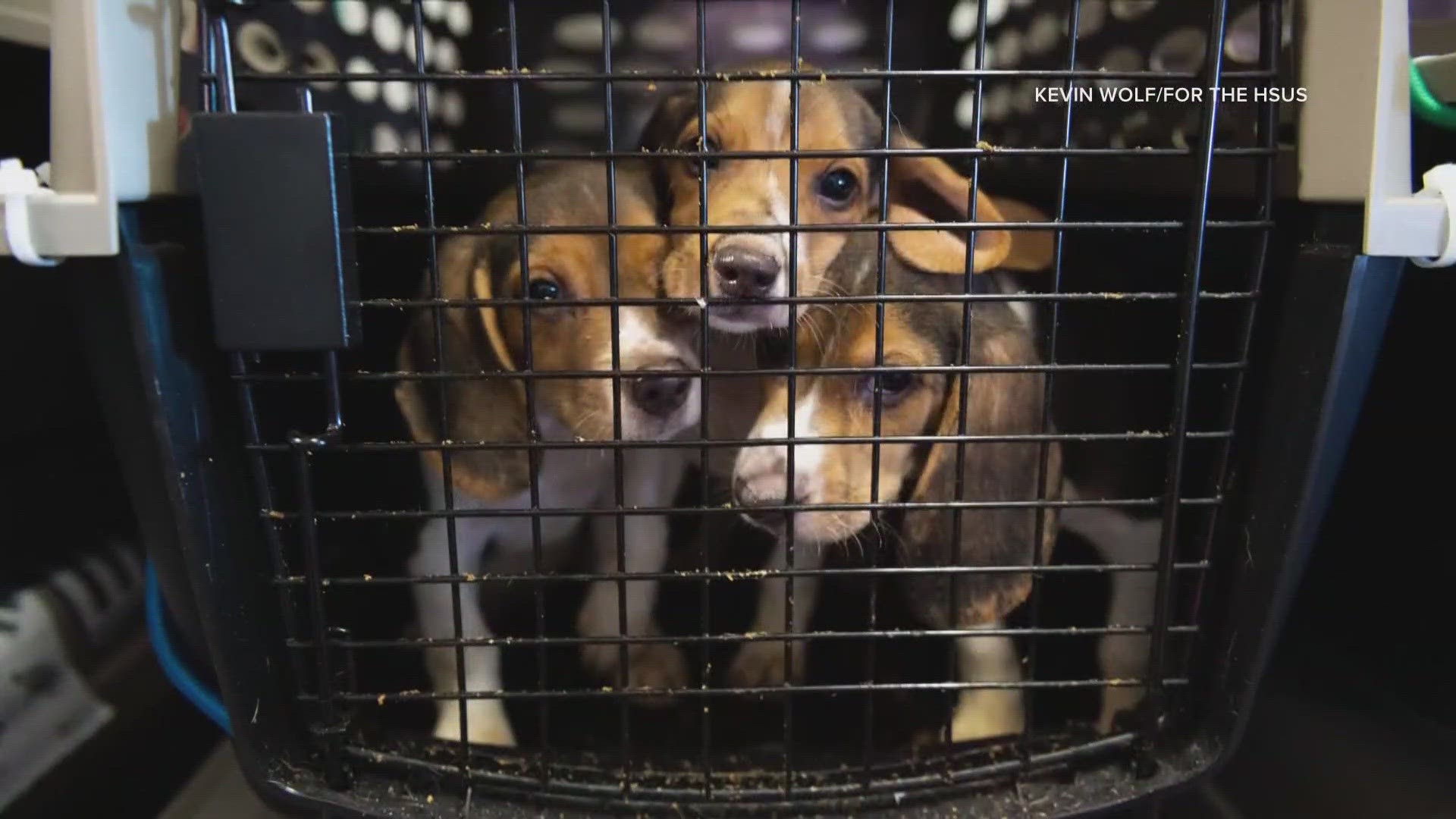PORTLAND, Maine — It's been one whole year since thousands of beagles were rescued from a life of medical research and dispersed to shelters all across the country to find new homes.
Envigo, a facility in Virginia that was breeding dogs to sell to laboratories, was shut down following multiple animal welfare citations including unreported deaths and improper vet care.
According to a lawsuit filed by the U.S. Department of Justice against Envigo, an investigation revealed dogs were denied nutrition to stop the flow of breastmilk after giving birth, and puppies had to fight adult dogs for access to food.
"Government inspectors found that beagles there were being killed instead of receiving veterinary treatment for easily treated conditions; nursing mother beagles were denied food; the food that they did receive contained maggots, mold and feces; and over an eight-week period, 25 beagle puppies died from cold exposure," according to a blog post by the Humane Society of the United States (HSUS) in 2022.
"They basically were breeding beagles as quickly as possible to be sold to research institutions for various types of research. So these dogs were destined for a life of loneliness and pain in a research facility," Katie Hansberry, who is part of the Maine division of the HSUS, said.
When Envigo closed its doors, the HSUS was suddenly responsible for moving the nearly 4,000 animals to shelters across the United States. Maine was one of the last states to get a shipment of about 100 dogs and puppies.
"Maine was taking on a financial burden from spaying and neutering to making sure they had everything they needed," Patsy Murphy said.
Murphy is the executive director for the Animal Refuge League of Greater Portland, or ARLGP, which was one of nine shelters and organizations to welcome the dogs. The eight others included Tall Tails Beagle Rescue, Greater Androscoggin Humane Society, Kennebec Valley Humane Society, Responsible Pet Care of Oxford Hills, PAWS in Camden, Pope Memorial Humane Society, and Franklin County Animal Shelter.
We met with three families, all with different backgrounds, who adopted a beagle from the ARLGP one year ago.
Kathy Hirst told us she fell in love instantly when she met her beagle, Gracie.
"[Patsy Murphy] put her in my arms and I was like, 'It's glued, you're not getting this dog back,'" Hirst said.
At just about a year old then, Gracie hadn't known a life outside of a cage at Envigo.
"When these dogs came in to us they didn't have names, they had green tattoos on the inside of their ear," Murphy said.
Gracie's tattoo is fading, along with her terror of crates, cars, or even just being outside.
"There's no ceiling, there are no sides, so she was afraid of that," Hirst said. "She would sometimes scoot out the door and flatten."
"I think it was all such an incredible learning experience for him," Suzanne Brown-Pelletier said of her beagle, Sir Biscuit of Barkingham. "He had lived his life in a kennel, never been outside, so every single thing was new to him. Everything. Whether it was car rides, whether it was to shut a refrigerator door, whether it was accidentally dropping a fork on the floor. Everything was new, and I think that was a lot to absorb."
One year into their new lives, it was unique to reintroduce three of the Envigo beagles. Gracie, Biscuit, and Artemis Howl all had their share of sniffs, then seemed to settle into their new surroundings. Their owners had a chance to swap stories about their own learning curves with these nervous pups, and the joys of experiencing new things.
"[She's] super cuddly, very affectionate, wild at times," Adam Ricci said as his beagle Artemis snuggled into his neck. "Tons of energy when she has a little moment of zoomies, when whatever she's feeling just wants to get out."
The reunion was also a rare moment for Hansberry and Murphy to see the results of their hard work.
"This is a huge shot in the arm for myself, my team, our community, our board members here today," Murphy said. "We rarely take the opportunity to stop and look back, we're so present in the moment, we're so focused on what's ahead of us, who needs us next, what's the next life that's hanging in the balance? So to take this opportunity to stop and reflect a year later is really an important inspirational moment for our team."
These pups, all across the country, have now become ambassadors of sorts to incite change at the federal level, Hansberry told us, to better protect more animals. Because of what they saw at Envigo, Hansberry told us the Humane Society of the United States is pushing for the Better Care for Animals Act, which would give the U.S. Department of Justice more tools and remedies to enforce the Animal Welfare Act. That act already prevents breeding or research facilities from certain levels of animal cruelty, but the goal is to give the DOJ and the U.S. Department of Agriculture more room to enforce.
"It's been gratifying," Hirst said. "Really gratifying to see the rebound."

